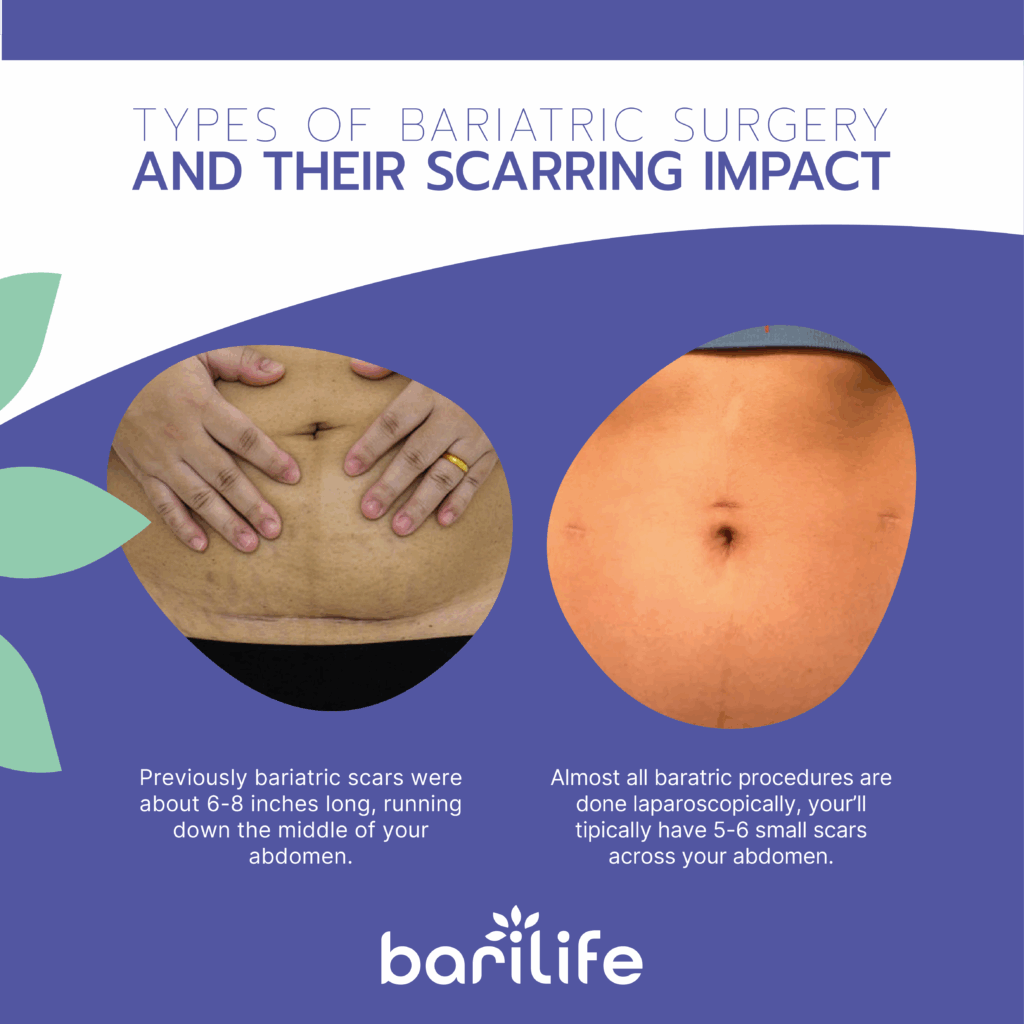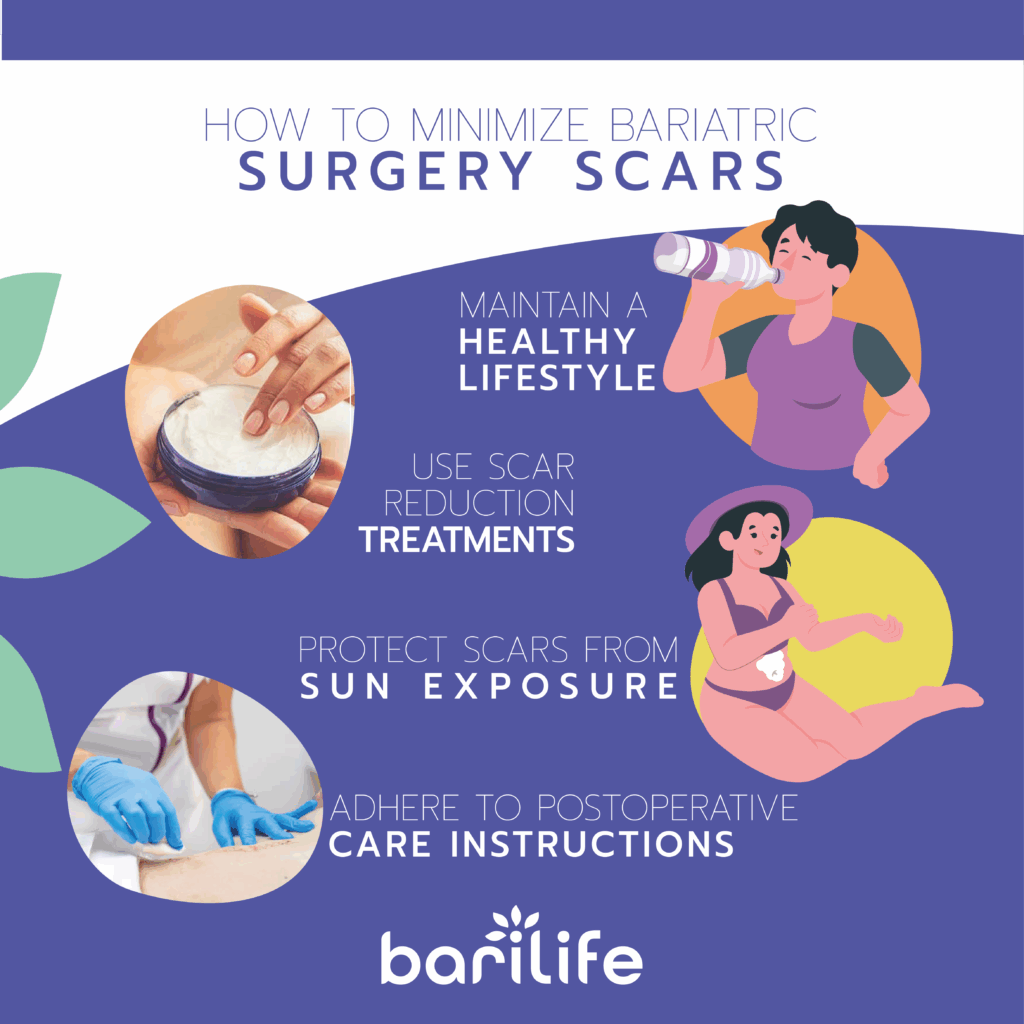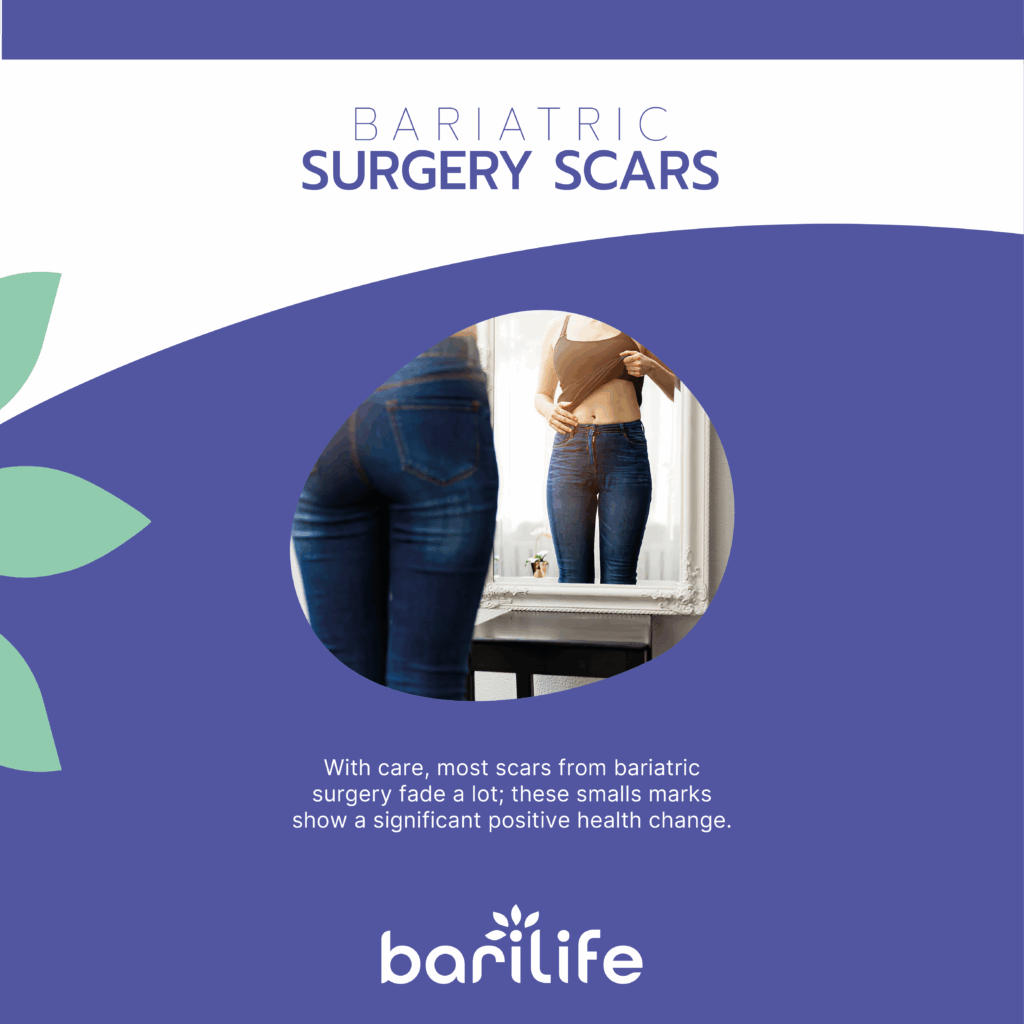Key Takeaways:
- Laparoscopic procedures typically result in smaller, less noticeable bariatric surgery scars than traditional open procedures
- Taking care of your wounds and scars properly can greatly improve the appearance of scars after bariatric surgery
- While physical healing is important, addressing the emotional impact of bariatric scars is equally necessary for complete recovery
Going through a weight loss journey with bariatric surgery is a life-changing decision. While many people focus on the benefits of weight loss, there are also questions about scarring.
This guide takes you through everything you need to know about bariatric surgery scars, so you can mentally and physically prepare for the transformation.
What is Bariatric Surgery?

Bariatric surgery refers to several different weight-loss procedures that help severely obese individuals lose weight. These surgeries work by changing the digestive system to limit food intake, reduce nutrient absorption, or both.
These procedures aren't just about looking better. They're mainly done to improve health problems related to being severely overweight, like diabetes, high blood pressure, heart disease, and sleep apnea. When diet and exercise haven't worked, bariatric surgery can be a life-saving option.
Understanding the bariatric surgery pros and cons is essential before making this important health decision. The benefits of long-term weight loss and improved health must be weighed against potential risks and bariatric surgery side effects, such as nutritional deficiencies, dumping syndrome, and healing complications.
The most popular types of bariatric procedures include sleeve gastrectomy, gastric bypass, adjustable gastric banding, and vertical banded gastroplasty. Each procedure has different approaches, benefits, and, yes, different scarring outcomes.
Types of Bariatric Surgery and Their Scarring Impact
The type of bariatric surgery you undergo directly affects the number, size, and placement of your scars. Here's what you can expect from each procedure:
Gastric Bypass Surgery (Roux-en-Y)
This popular procedure involves creating a small stomach pouch and rerouting part of your small intestine. When done laparoscopically (using small tools inserted through tiny bariatric surgery incisions), you'll typically have 5-6 small scars across your abdomen, each about 1/4 to 1 inch long. If you need open surgery (which is less common today), you might have one larger scar, about 6-8 inches long, running down the middle of your abdomen.
Sleeve Gastrectomy
About 80% of your stomach is removed during this procedure, leaving a banana-shaped "sleeve." Like gastric bypass, sleeve gastrectomy is usually done laparoscopically, resulting in several small bariatric sleeve scars across your abdomen. These scars are typically less noticeable than those from open surgery.
Adjustable Gastric Banding
This surgery involves placing an adjustable band at the upper part of your stomach to create a small pouch. Your surgeon can adjust the band to be tight or loose. Since gastric banding is almost always done laparoscopically, you can expect minimal bariatric scars—usually 3-5 small incisions.

Vertical Banded Gastroplasty
This older procedure combines stomach stapling with a band to limit food consumption. While less common today, it typically results in scarring similar to other laparoscopic procedures. If done as open surgery, you can expect a larger, vertical scar.
Factors Affecting Scar Formation
Several factors can influence how your scars from bariatric surgery will look.
- Surgical technique: Laparoscopic surgery results in smaller, less noticeable scars compared to open surgery. Today, most bariatric procedures are performed laparoscopically unless there's a specific reason to use open surgery.
- Individual healing factors: Your genetics, age, skin type, and overall health greatly affect how you heal. Some people naturally form more visible scars, while others heal with barely noticeable marks. Darker skin tones may develop more visible scarring in some cases.
- Postoperative care: How you care for your incisions after surgery significantly affects your scar’s final appearance. Make sure to follow your doctor's instructions for bariatric wound care so you can minimize the appearance of the surgery’s scars.
- Health conditions: Certain conditions, such as diabetes, can slow down healing and affect scar formation. Additionally, smoking impairs healing and can lead to more noticeable scarring.
How to Minimize Bariatric Surgery Scars
While some scarring is inevitable, these strategies can help minimize bariatric scars:
- Adhere to postoperative care instructions: Keep your incisions clean and dry as directed. Don't remove dressings until your healthcare provider says it's okay. Watch out for signs of infection like warmth, increased redness, or drainage.
- Use scar reduction treatments: Once your incisions have fully healed (usually after 2-3 weeks), you might use silicone sheets or gel to improve the appearance of your scar. When used consistently, these products can help flatten and fade scars.
- Protect scars from sun exposure: UV rays can darken scars and make them more noticeable. Keep them covered or use SPF 30+ sunscreen for at least a year after surgery.

- Maintain a healthy lifestyle: Proper nutrition supports healing. Focus on protein intake and stay hydrated. Vitamin C and zinc are also helpful for wound healing and healthy scar formation.
- Maintain a steady weight: Rapid weight fluctuations can stretch your skin and make scars more noticeable. Try to maintain steady weight loss after your surgery.
Psychological and Emotional Impact of Scarring
The impact of bariatric scars goes beyond physical appearance. Many people have mixed feelings about their scars after bariatric surgery. While some see them as badges of courage and positive change, others may feel self-conscious, especially when they’re very visible.
Concerns about others noticing or asking about scars can affect how you interact socially. Some people might avoid activities like swimming where scars would be easy to see. It's normal to have some emotional reaction to your changing body, including your scars. However, if concerns about scarring lead to significant distress or social isolation, consider speaking with a mental health specialist who specializes in body image issues.
Long-Term Expectations and Scar Evolution
Understanding how scars change over time can help you manage your expectations.
Fresh scars are typically red or purple and may be raised. Over time (usually 6-18 months), they naturally fade to a lighter color and flatten. Expect your surgery scars to look their worst in the first few months, so be patient.
Some people develop hypertrophic or keloid scars, which are raised, thick, and sometimes uncomfortable. Talk to your doctor if you notice your scar becoming increasingly raised or spreading beyond the original incision line.
For problematic scars, treatments like laser therapy, steroid injections, or even surgical revision might help improve their appearance. If you're unhappy with how your scars are healing, you can discuss these options with your doctor.
Conclusion

Bariatric surgery scars are a reality of your weight loss journey, but they don't have to define your experience. Most scars after bariatric surgery fade significantly over time, especially with proper care. Remember that these small marks represent a significant positive change in your health and quality of life.
While it's natural to be concerned about scarring, try to keep perspective – the health benefits of successful weight loss surgery far outweigh the cosmetic concerns of a few small scars. With modern surgical techniques and proper aftercare, many people end up with minimal, barely noticeable bariatric scars.
Your journey is about transformation, inside and out. Those small marks tell the story of your commitment to better health and a fuller life—something to be proud of, not hidden away.
How Bari Life Can Help
Our specially formulated bariatric vitamins provide the vital nutrients your body requires for optimal healing. Ingredients like Vitamin C, Zinc, and protein are crucial for collagen production and proper wound healing, directly affecting how your scars develop and fade over time.
At Bari Life, we understand that every patient has unique needs. That’s why we offer a complete line of supplements, including bariatric multivitamins, bariatric vitamins chewable, and even a liquid bariatric vitamin option for those who prefer not to swallow pills. For those needing extra support, we also offer a bariatric multivitamin with iron, ideal for maintaining energy and replenishing nutrient levels after surgery.
Protein plays a key role in your body’s ability to heal. Our bariatric protein shakes are specially formulated to provide high-quality protein in a convenient, great-tasting format. We also carry bariatric protein bars that make it easy to stay on track with your nutrition throughout the day, whether you're at home or on the go.
Healing well also means maintaining overall wellness. Our bariatric probiotic supplements support gut health, which is essential for nutrient absorption and immune function. Meanwhile, our bariatric vitamins for hair loss are formulated to address one of the most common post-op concerns—helping you maintain strong, healthy hair during your recovery.
Don’t forget to keep your snacks in line with your health goals. Our tasty and nutritious bariatric snacks are designed to satisfy cravings while staying within your dietary needs. And to support bone health, we offer bariatric calcium chews that deliver calcium in an easy and enjoyable form.
Take control of your healing journey and give your body the support it deserves. Visit Bari Life's website today to explore our complete line of bariatric-specific supplements made to support your best recovery and results.
If you want to learn more, why not check out these articles below:
Resources
Laparoscopic gastric band placement. (2023). StatPearls.
Moores, J., (2013). Vitamin C: a wound healing perspective. Br J Community Nurs.
Itthipanichpong, Y., (2020). Skin manifestations after bariatric surgery. BMC Dermatol.

Leave a Comment
Your email address will not be published.